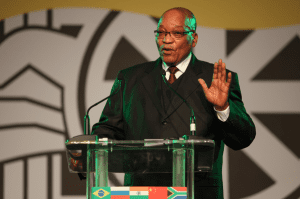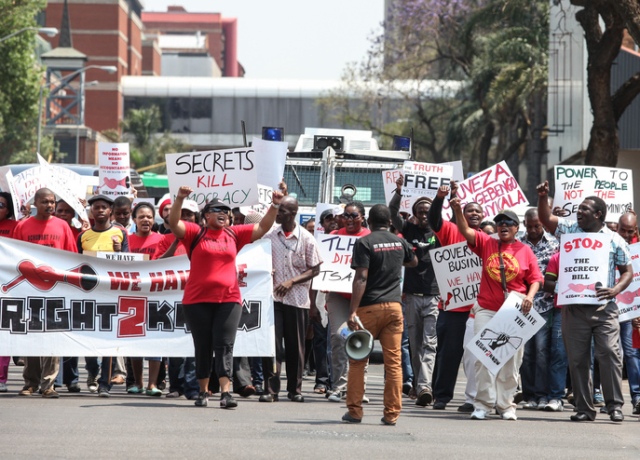7 Jan 2016 | mobile, News and features, South Africa

Jacob Zuma (Photo: Jordi Matas / Demotix)
With the new year comes a new battle in South Africa as critics hit back at the proposed “draconian” Cybercrimes and Cybersecurity Bill they say doesn’t differentiate “between espionage and an act of journalism”.
The bill comes against the backdrop of ongoing government hostility towards the media. Exposés by journalists of corruption and cronyism within the ranks of the governing African National Congress (ANC) have led to accusations by the party that the media casts it in a “negative light” and acts in opposition to it.
On the face of it, the legislation is a ham-fisted attempt to push through by stealth key aspects of the stalled and deeply flawed Protection of State Information Bill, which was first introduced in parliament in March 2010.
Dubbed the Secrecy Bill, it has reached the penultimate step in the legislative process, requiring only that President Jacob Zuma sign it into law. But, in the face of stiff opposition and threats of a Constitutional Court challenge, it has been gathering dust on the president’s desk for over two years, unsigned.
“Whole sections of the [Cybercrimes] Bill are copy-and-paste from the Secrecy Bill,” says Murray Hunter, a spokesman for the freedom of expression Right2Know (R2K) campaign. A draft version of the bill was published in August last year, with two months allowed for comments.
In a preliminary submission, R2K says some provisions of the Cybercrimes Bill go way beyond those contained in the Secrecy Bill and include “harsh, draconian penalties that would muzzle journalists, whistleblowers and data activists”.
The bill makes it an offence to “unlawfully and intentionally” hold, communicate, deliver, make available or receive data “which is in possession of the state and which is classified”. Penalties range from five to 15 years in jail and, worryingly, there is no public interest defence or whistleblower protection.
R2K has also highlighted some of its key objections to the bill in a document entitled What’s Wrong With the Cybercrimes Bill: The Seven Deadly Sins.
Hunter concedes that while policies that promote the online security of ordinary citizens are necessary, the bill is part of a raft of new “cybercrime laws popping up across the world that threaten internet freedom”.
“The policy debates in the US and UK are examples of a renewed appetite for backdoor access to privately-owned networks,” he says. “The idea is usually that governments say they want to users to have greater security against ‘outside’ threats, but still want government agencies to be able to penetrate that security.”
The bill effectively hands over the keys of the internet to South Africa’s Ministry of State Security and would dramatically increase the state’s power to snoop on users and wrests governance away from civilian bodies.
“Remember that security means protecting people’s information not only from ‘cybercriminals’, but also from state surveillance,” says Hunter.
Put another way, it’s a bit like having a really great lock on your front door, but leaving the spare key under the mat; either a system is secure against all threats or it is vulnerable to all threats.
Another big concern is that the bill, in its current form would potentially criminalise digital security analysts.
“One of the major protections for internet users’ security is a global community of security analysts and researchers who test the systems, apps and websites as a civic duty, in order to point out and fix security flaws that put the general public at risk,” says Hunter. “Basically, they are online activists who are constantly trying to find security weaknesses in other people’s systems [often belonging to governments and private companies] in order to point them out and get them fixed.”
But the bill would make these practices a criminal offence unless it was “authorised”, and in doing so would potentially make ordinary users less safe.
All of these moves contain uncomfortable historical echoes — it’s only been 22 years since South Africa became a democracy, and surveillance against citizens was among the apartheid government’s notorious specialties.
So the idea of a democratically-elected government, backed up by laws that legitimise intercepting its private citizens’ information, is especially fraught.
As temperatures soar and an “epic drought” tightens its grip on the country, all indications are that it’s going to be a long, hot summer in more ways than one, as activists and journalists prepare to fend off yet another attempt to curb South Africa’s hard-won freedom.
26 Apr 2013 | South Africa
South Africa’s parliament yesterday approved a controversial bill aimed at protecting state secrets. Dubbed the “secrecy bill” by its critics, the Protection of State Information bill was passed by 189 votes to 74. Campaigners against the bill warned of the “chilling effect” it could create for anyone fighting to bring government corruption to light.
The Right2Know campaign has been working against the bill since its introduction in 2010, and has vowed to continue fighting against the bill, which now must be signed by Jacob Zuma, South Africa’s president, in order to go into effect. Although the bill was amended last year to include a clause on public interest, the campaign says that the modified bill still “only has narrow protection for whistleblowers and public advocates”. Right2Know also criticised the bill’s vague language — which they say could possibly endanger whistleblowers and journalists.
Writing for Index on Censorship last year, Nobel laureate Nadine Gordimer said that the bill “must be discarded in its entirety.”
More on this story:
21 Nov 2012 | Africa, South Africa, Sub-Saharan Africa
South Africa’s Right2Know Campaign (R2K) is “Camping out for Openness” outside parliament in Cape Town this week as deliberations over the draconian Protection of State Information Bill draw to a close.
The National Council of Provinces, the second house of parliament, is due to adopt the bill by the end of November. The bill is ostensibly aimed at instituting a long-overdue system to regulate access to government documents.
However, despite persistent appeals from, among others, luminaries such as Nobel Laureate Nadine Gordimer, the Secrecy Bill’s system of classification and declassification has not been couched in the country’s constitutional commitment to an open democracy and the free flow of information.
Instead it opens the door to the over-classification of state information while instituting harsh punishments for the possession of classified information, undermining basic citizenship rights.
Pressure from civil society, led by the R2K Campaign, produced limited concessions this year. One of the most pertinent demands was to include a public interest defence clause to ameliorate the anti-democratic effects of the bill. The ruling African National Congress (ANC) eventually conceded by allowing a clause enabling a public interest defence, but only if the disclosure revealed criminal activity. This has been criticised as an unreasonably high threshold.

Right2Know march in Pretoria, South Africa, September 2012. Jordi Matas | Demotix
The ANC this month backtracked on two other key concessions, as pressure from state security minister Siyabonga Cwele on ANC parliamentarians seemingly paid off:
- The Secrecy Bill at first took precedence over the Promotion of Access of Information Act (PAIA). PAIA allows citizens to request information from government agencies. The ANC then agreed to an amendment that would give PAIA precedence. This decision was again overturned after pressure from Cwele. Activists argue that allowing the Secrecy Bill to trump PAIA is unconstitutional, as PAIA is prescribed by the constitution and has to remain the supreme law in access to information matters.
- A five-year sentence for disclosing classified information has been reintroduced after the ANC agreed to have it removed. This will actively discourage whistleblowers in the civil service from coming forward with information revealing corruption.
Cwele’s predecessor, Ronnie Kasrils, this week addressed the R2K camp outside parliament, distancing himself from what he deemed the “devious” and “toxic” bill. While he was minister, he withdrew the 2008 version of the bill after a similar outcry about its lack of constitutionality.
According to R2K, the other remaining problems with the Secrecy Bill include:
- It criminalises citizens instead of holding to account civil servants who are responsible for keeping secrets.
- A whistleblower, journalist or activist disclosing classified information with the purpose of revealing corruption or other criminal activity can still be prosecuted under the “espionage” and related offences clauses to avoid them invoking the limited public interest defence.
- Persons in possession of classified state information face draconian jail terms of up to 25 years.
- The bill’s procedure to apply for the declassification of information conflicts with PAIA, while the newly created Classification Review Panel is not sufficiently independent: “The simple possession of classified information appears to be illegal even pending a request for declassification and access.”
- Someone can be prosecuted for “espionage”, “receiving state information unlawfully” (to benefit a foreign state), and “hostile activity” even without proof that the accused intended to benefit a foreign state or hostile group or prejudice national security — only that the accused knew this would be a “direct or indirect” result.
- Information classified under apartheid law and policies that may be counter to the constitution remain classified, pending a review for which no time limit is set.
Parliament’s engagement with the bill, which started in July 2010, has been characterised by Orwellian “doublethink”, as exemplified in Cwele’s declaration that “protect(ing) sensitive information … is the oil that lubricates our democracy and we have no intention — not today, not ever — to undermine the freedom we struggled and sacrificed for all these years”.
R2K has vowed to continue pressuring parliamentarians to replace the Secrecy Bill with a law “that genuinely reflects a just balance between the public’s right to know and [the] government’s need to protect limited state information”.
Christi van der Westhuizen is Index on Censorship’s new South Africa correspondent
More on this story:
7 Sep 2012 | Africa, Sub-Saharan Africa
South Africa’s parliament is in its final stages of reviewing a bill that, if passed, could have severe implications for press freedom in the country and the African continent. The Protection of State Information Bill (also known as the Secrecy Bill) could result in the imprisonment of journalists and whistleblowers who possess, publish or leak state secrets for up to 25 years.
(more…)


